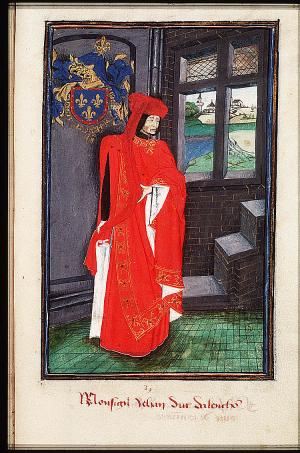John II, Duke of Alençon facts for kids
Quick facts for kids Jean II |
|
|---|---|
| Duke of Alençon | |
 |
|
| John of Alençon, dressed as a Knight of the Golden Fleece | |
| Spouse(s) |
Joan of Valois
(m. 1424; died 1432)Marie of Armagnac
(m. 1437; died 1473) |
| Issue | |
| Catherine René of Alençon |
|
| Noble family | Valois-Alençon |
| Father | John I of Alençon |
| Mother | Marie of Brittany |
| Born | 2 March 1409 Château d'Argentan |
| Died | 8 September 1476 (aged 67) Paris |
John II of Alençon (born March 2, 1409 – died September 8, 1476) was an important French nobleman. He became the Duke of Alençon and Count of Perche when he was very young in 1415. This happened after his father died in the famous Battle of Agincourt. John II is best known for being a general during the last part of the Hundred Years' War. He was also a close friend and fighting partner of Joan of Arc.
Contents
A Young Duke's Life
John was born in a castle called Château d'Argentan. His parents were John I of Alençon and Marie of Brittany.
First Battle and Capture
John first fought in a battle when he was only 15 years old. This was the Battle of Verneuil on August 17, 1424. Sadly, he was captured by the English during this battle. He was held as a prisoner until 1429. To be set free, he had to pay a huge amount of money, about 200,000 gold coins.
To get the money, he sold almost everything he owned. He even sold his land, called a fief, in Fougères to the Duke of Brittany. After John's capture, the Duke of Bedford took control of his duchy. The Duke of Bedford was acting as regent for the English King Henry VI. John would not get his duchy back until 1449. When he was finally released from prison, people called him "the poorest man in France."
His Marriages
Before he was captured, John married Joan in 1424. She was the daughter of Charles, Duke of Orléans. Joan sadly died in 1432 and they did not have any children.
Later, on April 30, 1437, he married Marie of Armagnac. They were married at the Chateau L'Isle-Jourdain.
Friendship with Joan of Arc
In April 1429, soon after he was freed, John heard about Joan of Arc. She had gone to King Charles VII at Chinon. Joan promised to free France from the English. She asked the king to send her with an army to help lift the Siege of Orléans.
John eagerly went to Chinon. He quickly became a very good friend of Joan of Arc. He was also her most important supporter among the royal family, known as princes of the blood. After Joan helped end the siege, John arrived as the official leader of the French army. He played a big part in freeing the rest of the Loire Valley. After this campaign ended in September 1429, he went to fight the English in other areas, especially around his lands in Normandy.
Later Challenges and Imprisonment
John was not happy with the Treaty of Arras in 1435. He had hoped to get rich by taking things from the Burgundians. He had disagreements with King Charles VII. He even took part in a revolt in 1439–40, called the Praguerie. However, the king forgave him because they had been friends for a long time.
He helped invade Normandy in 1449. But later, in 1455, he made a mistake by talking secretly with the English. Around this time, he also accepted the Order of the Golden Fleece, a special award.
Soon after he spoke at the "rehabilitation trial" of Joan of Arc in 1456, John was arrested. He was put in prison. In 1458, he was found guilty of lèse-majesté (treason against the king). He was sentenced to death, but this punishment was changed. Instead, he was sent to prison.
When the next king, Louis XI, came to power in 1461, John was released. But he did not follow the rules set for his release. So, he was put in prison again. He was tried a second time in 1474 and sentenced to death again. His duchy was also taken away. However, he was not executed. He died in prison in the Louvre in 1476.
Family Life
John had two children with his second wife, Marie:
- Catherine (1452–1505), who married Guy XV de Laval in 1461.
- René of Alençon (1454–1492), who later got back his father's titles of Duke of Alençon and Count of Perche in 1478.

